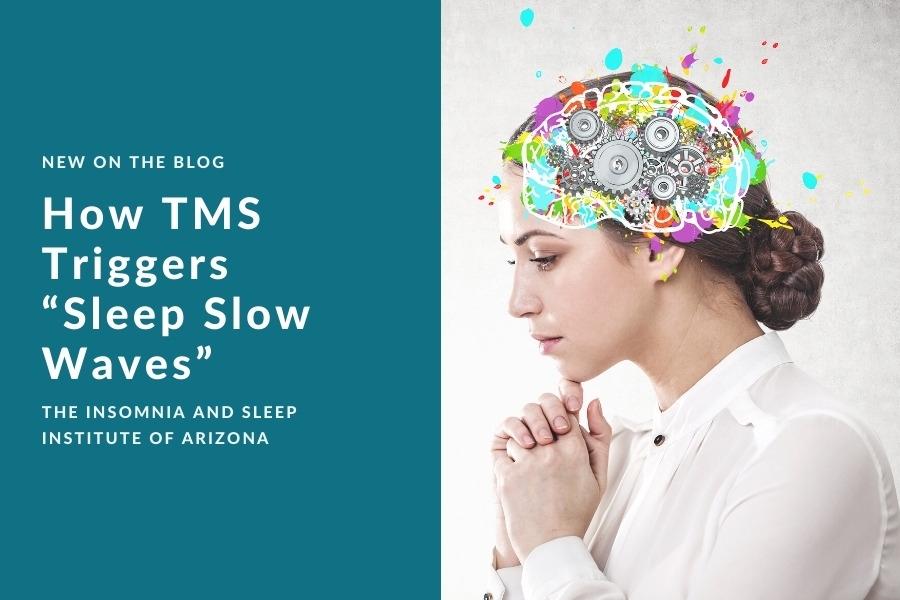There has been a growing interest in how transcranial magnetic stimulation, or TMS, might be useful in treating sleep disorders. The Insomnia and Sleep Institute of Arizona is committed to helping patients of all ages address and correct sleep disorders, which has earned us the title of the Face of Sleep Medicine in Arizona. Led by triple board-certified Dr. Ruchir P. Patel, we are an outcome driven clinic, and that means treatment needs to begin with the right diagnosis. That’s why, starting with your consultation, you meet with a sleep expert capable to diagnosing disorders. Just as important as a correct diagnosis is the right treatment—and that might mean TMS.
TMS has routinely been used as a quick and non-invasive way of treating various mental disorders, such as depression. However, a myriad of recent research has shown that it can also be helpful with sleep issues. While we are asleep, cortical neurons experience nearly perfectly in sync oscillation cycles, which leads to the biggest spontaneous waves recorded in an EEG. According to recent research published in Proceedings of the National Academy of Sciences (PNAS), when subjects are asleep, slow spindles and waves can also be triggered quite reliably via TMS. Researchers state that these “evoked” slow waves “lead to a deepening of sleep and to an increase in EEG slow-wave-activity (0.5 – 4.5 Hz), which is thought to play a role in brain restoration and memory consolidation.”
Better Sleep with Minimal Invasion
TMS was quickly adopted as a popular treatment because of its non-invasive nature. The researchers found that the slow wave results from TMS are nearly identical to those that occur spontaneously. A coil is placed on the head, which creates a magnetic field that can be turned on and off rapidly. However, the patient usually reports feeling very little if anything at all—which is why subjects in the research study were able to sleep through the treatment without any sleep aids. In fact, the magnetic fields are very similar to those produced by an MRI machine, so anyone who has had an MRI knows that you don’t “feel” anything during these tests.
Although TMS is affecting the brain, it does not affect the entire brain. The fields only reach 2 – 3 centimeters into the direct brain, and even then it is just right below the treatment coil. As the fields move into the brain, small electric currents are created. These currents are what activate the brain cells that are in charge of releasing various neurotransmitters like dopamine, serotonin, and norepinephrine. TMS was initially targeted as a depression treatment because oftentimes this mental disorder is caused by an imbalance in brain chemicals. Now, we are seeing that similar results may be achieved for certain sleep disorders.
What to Know About TMS
Although some patients experience relief after just one TMS session, which is often fast enough to fit into a lunch-hour appointment, most patients need a few sessions for optimal results. Depending on the type of sleep disorder, the severity, and how your body responds to TMS, routine “maintenance” sessions may be recommended. However, TMS quickly became a favorite tool for all kinds of patients because it is painless, non-invasive, and requires no medication or at-home tools that need to be used nightly.
Currently, Insomnia can be acute or chronic, and a recent report found that those with chronic, ongoing insomnia have abnormal MRI results. is the most common sleep disorder that TMS can treat. Chronic insomnia is a serious condition that may be caused by a variety of factors. Typically, combining cognitive behavior therapy (CBT-I) with other treatments, including TMS, is usually the best approach. You may also be a good candidate for TMS if CBT-I has failed or did not comprehensively work for your condition. Everyone experiences acute, short-term insomnia episodes in their lifetime (such as jet lag), but chronic insomnia leads to ongoing sleep deprivation and that negatively impacts every part of your life physically, socially, emotionally, and mentally. Sleep deprivation is linked to a number of other physical and mental health conditions.
Get Help for Your Insomnia
Anyone of any age can experience chronic insomnia, but it’s most common in adult women. If you are looking for a medication-free, non-invasive means for treating your insomnia, help is available. The Insomnia and Sleep Institute offers unparalleled staffing levels, including a clinical psychologist on staff who focuses on CBT-I. We are home to the “Top Doc” in the region, as voted by his peers, for the last six consecutive years and are proud to set the gold standard in sleep medicine around the state.
No referral is needed for treatment at our clinic. The sooner you get help for your insomnia, the sooner your health can be restored. Schedule your consultation for insomnia treatment at The Insomnia and Sleep Institute by getting in touch today. Call the office or, for the quickest response, start an online chat during business hours or complete the online form now.





